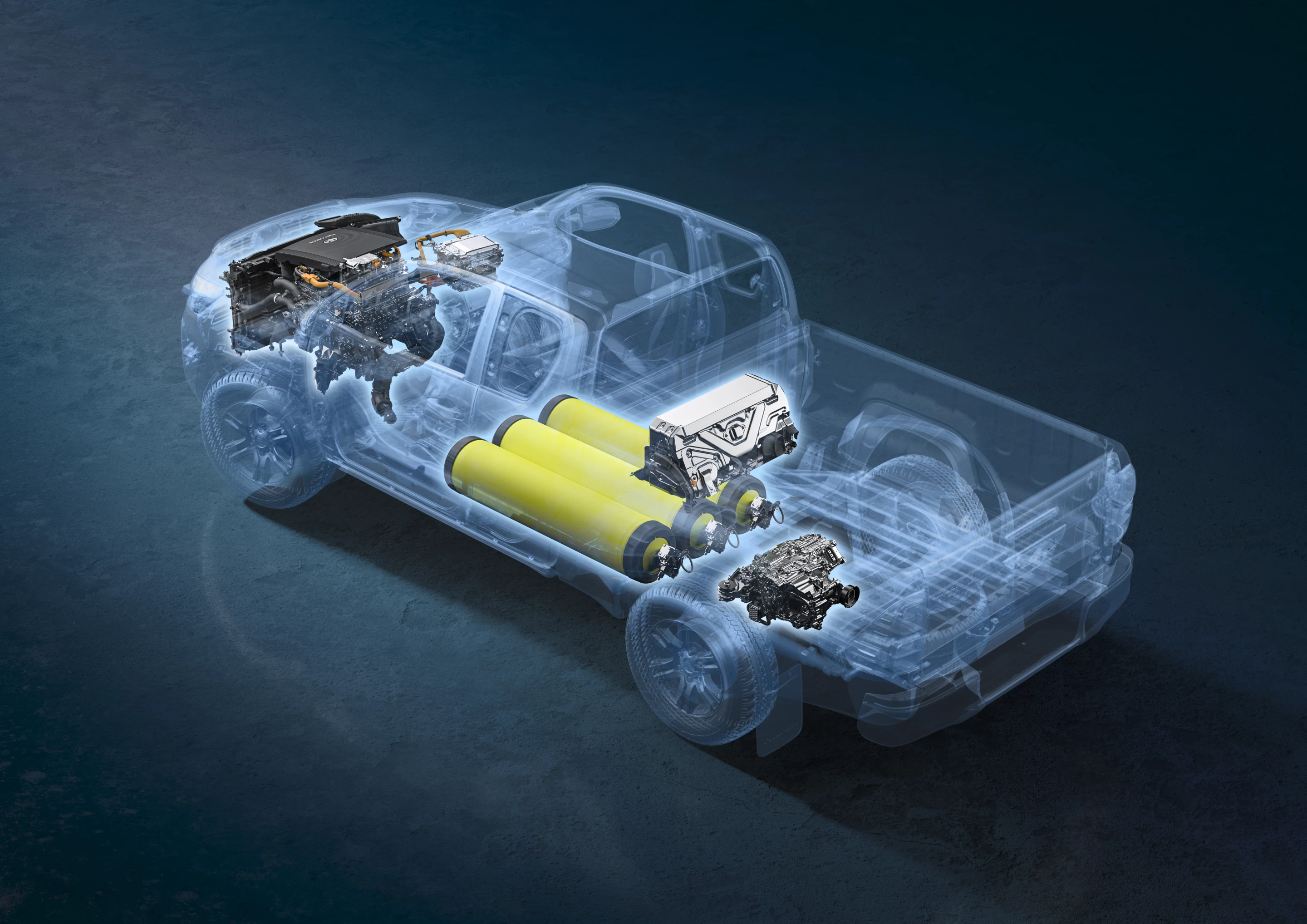Toyota attempted to put to rest doubts about its EV commitment exactly a year ago when it held a media briefing to detail future battery electric vehicle (BEV) plans. But that doesn't mean it's transitioning into an all-BEV brand anytime soon. It's still forging ahead with other sustainable powertrain technologies, too, and a pair of recently debuted Hilux concepts reasserts its multi-pronged strategy. The Hilux Revo BEV concept pickup makes its first appearance just days after Toyota announced forthcoming work on a hydrogen fuel cell Hilux prototype. Will the future of Toyota's most popular global pickup include battery power, hydrogen or a combination of both?
Toyota didn't reveal the Hilux Revo BEV at a major auto event or dedicated debut, instead providing a sneak peek at Toyota Motor Thailand's 60th anniversary celebration this week. It was a very quiet reveal, with no powertrain details given, but Toyota president Akio Toyoda used the occasion to reiterate the company's multi-fuel carbon-cutting strategy during his address.
"I am often criticized in the press because I won't declare that the automotive industry should commit 100% to BEV," Toyoda conceded. "I believe we need to be realistic about when society will be able to fully adopt Battery Electric Vehicles and when our infrastructure can support them at scale. Because just like the fully autonomous cars that we were all supposed to be driving by now, I think BEVs are just going to take longer to become mainstream than the media would like us to believe. And frankly, BEVs are not the only way to achieve the world's carbon neutrality goals."
"Personally, I would rather pursue every option not just one, options such as emission-free synthetic fuels and hydrogen," Toyoda continued. "I still believe hydrogen is as promising a technology for our future as BEV."

Toyoda then touched upon plans to continue offering and exploring a variety of powertrain solutions, from battery electrics, to hybrids, to hydrogen combustions engines and fuel cells. His words come on the back of recent announcements about hydrogen-engined Cross Corolla and fuel cell Hilux prototypes. The latter is being put together by Toyota Motor Manufacturing UK with the help of funding from the UK's Advanced Propulsion Centre.
In cooperation with Toyota Motor Europe R&D and partners including Ricardo and European Thermodynamics, Toyota UK intends to adapt components from the second-generation fuel cell powertrain featured in the Mirai. It will build the Hilux H2 prototype in 2023 and hopes to send it to small series production after successful testing and verification.

Toyota remains more tightlipped about the Hilux Revo BEV, but we can see that it wears a wicked rear wing over top the back of the bed, at least for a little celebratory conceptual flair. Toyota chose the Thai event for a sneak preview as a nod to the role that Toyota Motor Thailand played in developing the global IMV platform and Hilux Vigo in the early 2000's, a cornerstone of the company's globalization efforts at the time.
Toyoda revealed the Revo concept alongside another truck concept called the IMV 0, framing that one as an affordable truck meant to "support economic growth and mobility for all." It designed the small, utilitarian IMV 0 truck concept after careful observation of potential buyers' needs and lifestyles and says the official launch is over a year away.

The Hilux BEV Revo is described as being on the opposite end of the automotive spectrum from the IMV 0, designed for a different customer with different needs. It is not the first electric pickup concept at which Toyota has flashed a quick look. At last year's BEV briefing, Toyota revealed a rugged EV pickup (without random wing) among over a dozen other electric design studies that served as the backdrop for its announcement of plans to introduce 30 new BEV models by 2030.
We'll see how many hydrogen-fueled models join those BEVs by decade's end and where the Hilux fits into the puzzle.
Sources: Toyota, Toyota Europe










